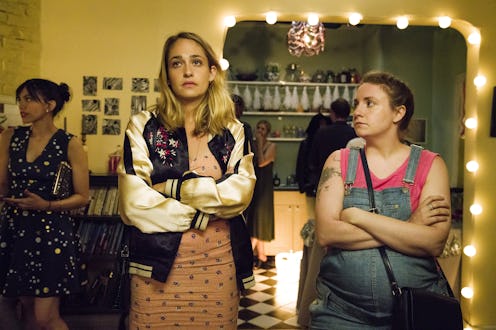Entertainment
The Girls From 'Girls' Haven't Changed Much & Here's Why That Matters

As a Millennial who fits squarely in Girls' intended demographic, watching the show for the past six years has felt like being in a twisted house of mirrors that only reflect the joys and schadenfreude of my own life. To me, and I'm sure to many other women watching, the legacy of Girls is about women not changing in order to fit a prescribed ideal — the women of the show certainly haven't changed. We don't need to magically transform, we don't need to sort out all of our issues before we turn 30, and we sure as hell don't need to stick the landing every time. We can be messy and falling out of friendships and maybe jumping into parenthood and the world isn't going to come crashing down around us.
In small ways, these women — Hannah, Jessa, Marnie, and Shoshanna — have definitely changed over the last six seasons. It speaks volumes about the kind of women they've become that they only changed incrementally, that they've only leapt over the abyss of failure when the big moments have called for it, and that at the end of it all, they're going to remain just as hopelessly, happily messy as they began. They've changed enough to make us feel hopeful they'll be OK in the future, but the traces of naïveté we saw in Season 1 are still there.
They ended up learning some tough lessons about life and love. They got out of jobs as quickly as they got into them. Most glaringly, those bad habits of theirs — precociousness, selfishness, the inability to commit, etc. — became the things that prevented their growth most of all. These were the things they were each, in some way, working to overcome over the last six years.
As it stands ahead of the series finale, we know a few things for certain about the main characters on Girls: Hannah is going to make her mark on the world, like she set out to do in the pilot, by changing lives on a college campus as a college professor and as a mother. Jessa is still focused on herself, but her journey to recovery and stability is moving a bit further along. Shoshanna, who has only ever craved to have to Carrie Bradshaw-esque lifestyle she saw other women her age have (career, marriage, living happily and stylishly) is within reach of that dream. Marnie still never got all the answers to how she should live her life and the last time we saw her, she was giving out her number to a bunch of men who could potentially become the one who gives her existence meaning, which is exactly where she was in Season 1.
These women have come so full circle as Girls winds down that they're arguably back at square one. I don't want to be reductive about their emotional journeys or suggest that they've learned absolutely nothing over the last six years, but they haven't made the leaps and bounds people might expect to make in real life, or that other series would push their characters to make. If your early 20s is a messy learning process and primer to the rest of your adult life, then the four women of Girls are still, emotionally, in their early 20s.
The easy takeaway of Girls is that growing up is tough and doesn't happen easily. The complicated takeaway is that it's actually OK that these women didn't morph into the high-functioning, uber-successful, very put-together women we may have hoped they would become. Life doesn't transform quickly for any one person. Where you end up at 27 is not where you thought you'd end up when you were 21. It's a relief to see these women confronting adulthood (finally) and accepting it, but it doesn't mean that they had to solve all of their problems before the final credits.
This attitude of digging your heels in and really refusing to change in a major way says a lot about what the lasting impact of Girls will be. It's freeing to know that Hannah, Marnie, Shoshanna, and Jessa haven't changed in the last six years.
If one goal of the show was to identify with these women, then knowing that they haven't profoundly matured to the point they're unrecognizable when I'm still also struggling in my late 20s is a freeing thing. It makes it feel like the time I spent with them over the last six years was all the more worth it. Change is good, but sometimes changing too quickly only leaves you feeling alienated from yourself.